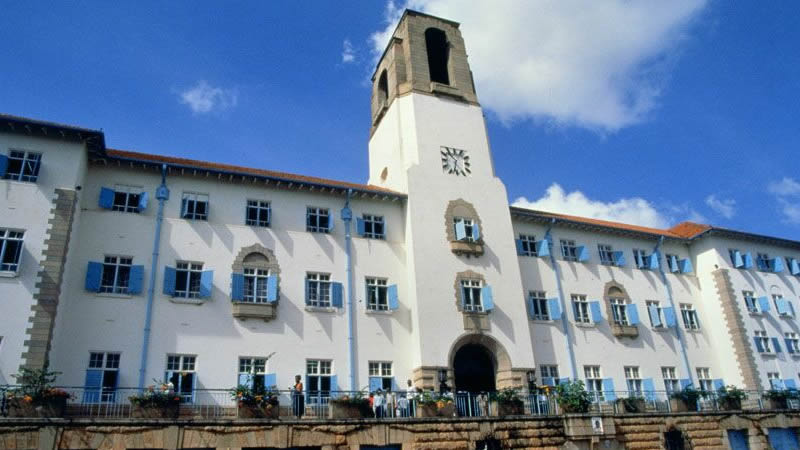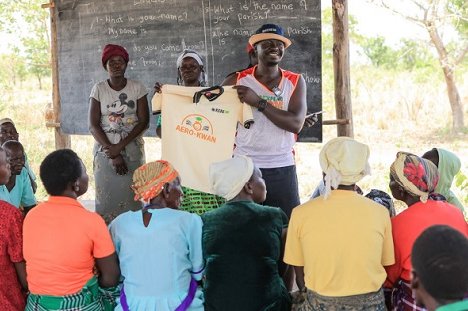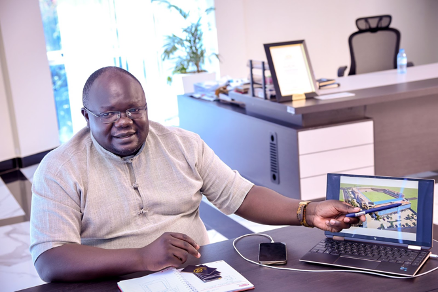By Claire Zerida Balungi
On a delightful Sunday evening of August 1999, Amos Zikusooka checked into Makerere University’s Livingstone Hall. “Livingstone Hall was beaming. It was the best home away from home anyone could wish for,” he remembers. Right from orientation, Zikusooka was sold on the idea of excellence and braced himself for the challenge. Since its inception in 1988, the Mass Communication (now Journalism and Communication) Department where Zikusooka would be studying for the next three years had sauntered on, a first class degree shy. Privy to this public secret, Zikusooka’s ambition burgeoned. It did not help that he had been quite the intellectual since his high school days at St Francis Secondary School, Kawempe. He seemed to have an incredible nerve for urgency with his coursework as he got down on it the minute his lecturer presented it to the class. He was the typical A-student who took time reading in the library and polished his write-ups beforehand. When he graduated with the first ever first class degree at the Department of Mass Communication, gathering a 4.7 Cumulative Grade Point Average (CGPA) in 2003, it was a memory to be savoured.
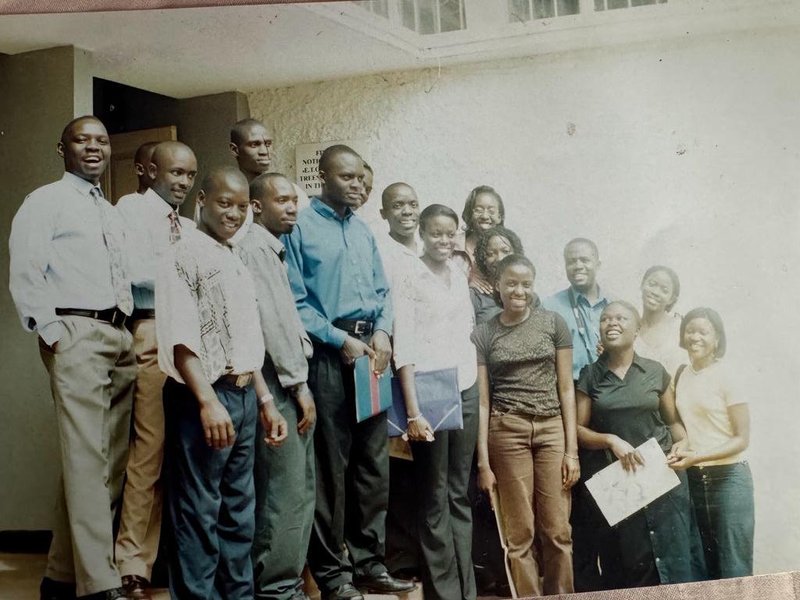
Zikusooka’s class, Mass Communication Day Class 1999/2002 pose for a photo outside the Faculty of Arts building, after one of the lectures in 2002.
Starting...
In Primary Four, Zikusooka’s teacher asked him what he wanted to be. Greatly enamoured by the correspondences on the BBC Radio, his answer was “I want to be a journalist.”
Journalism for him at that point meant traveling the world and learning so much about people. Trotting up the academic ladder, he led with his best foot and got shortlisted for Mass Communication on government sponsorship. The course was known for its cutthroat edge especially at that time. Twenty years on, his record dazzles in the Department of Journalism and Communication, making him a trailblazer.
But it wasn’t all glory at the start. The first fire he made certainly wasn’t as hot as he’d anticipated. Adjusting to the new university environment in his first year, Zikusooka’s ambition was shaken by two “miserable” marks that went on his academic report; 55 and 65.
“My only job was to go to class, read and pass,” Zikusooka seemed a little flustered even as he remembered this moment which stirred much agitation in him once he set eyes on his pitiable results.
He had not the pressure of waking up to tick things off a list. Barely an early morning person, all Zikusooka had was a class timetable. On an ordinary day, he rose at 7 o’clock to look for breakfast and prepare for class after which he’d go out with his friends. Some Saturdays, he attended Prime Time at the Pool and got refreshed with fine music and Pr Martin Ssempa’s gospel. “I had no psychological complications, no pressure to look for money, buy a car or have a girlfriend,” he says.
Rather than discourage him, that difficult performance seemed to shoot him above the skies. He kept his brain among the pages of his notes, repossessed his ground and never looked back.
Making first class
He is articulate about “the power of day one” as the best ingredient for his distinction. Unlike many a last-minute student whose indolent attitudes made them susceptible to mediocrity, Zikusooka wisely utilised the two weeks allowed for completing every coursework. “I started on day one, read all the necessary books in the library and organised my thoughts. I worked on my work over and over again and had more time to prepare for exams,” he says. He was intentional about his education and did not dread attending class. Zikusooka enjoyed exams quite a lot as following instructions is to him a lifestyle, reading and doing exactly what’s expected of him comes easily.
While they did school, Zikusooka’s colleagues had found in him the capacity of a lecturer and teasingly assigned him residences that were occupied by lecturers on campus. At quite the young Mass Communication Department at that time were young and relatable lecturers. He respected, looked up to them and could see himself in their shoes in a few years. Prof. Monica Chibita, the coordinator for Mass Communication, was especially venerable to him. “She was excellent, confident and knowledgeable... how she carried herself!” he sighs.
“My motivation was not only about good academic goals but was also social. We were a group of about 20 neat friends,” says Zikusooka, who supported and was supported by his friends. Forget students sitting around after class for banter’s sake, he was genuinely interested in his classmates: “Sara Namusoga, Pauline Nassanga, Joey Nakigozi, Masembe Muhammad, Shaban Lukoya...” on he goes. They generally looked out for one another and shared study resources.
“Amos was a superstar. He was generous and discussed for the rest of us. We were only 24 in our class, fairly close,” says one of Zikusooka’s classmates. In addition to heeding simple basics like not “cutting lectures”, Zikusooka looked forward to meeting and playing with his friends “like kids”.
On a normal after-class day, when he wasn’t playing football at Livingstone Hall, he would be hanging out with friends around Wandegeya, eating chicken or pork, or grabbing lunch at Kikumi-Kikumi. He says he was one of the key influencers in the hall and people looked up to him for encouragement and advice although he was not officially a leader. All play, but hard work was paramount as “not every day is a good day,” he notes.
The hard work pays off
“If you do your coursework and exams well, the lecturers are happy to give you the marks. Cumulatively, you see it coming. My last name, Zikusooka starts with the last letter, ‘Z’. I would look at the bottom of the list and track my results. All the hard work and reading... when the final results were pinned, it was validation!” recalls Zikusooka whose news of the first first class degree electrified the department’s atmosphere. He was awarded the Tebere-Mudin Annual Commemorative Award which is given to the overall best Journalism and Communication student, sponsored by Daily Monitor in honour of former editors, Richard Tebere and Rashid Mudin who died in a gruesome motor rally accident in Karamoja in 1998.
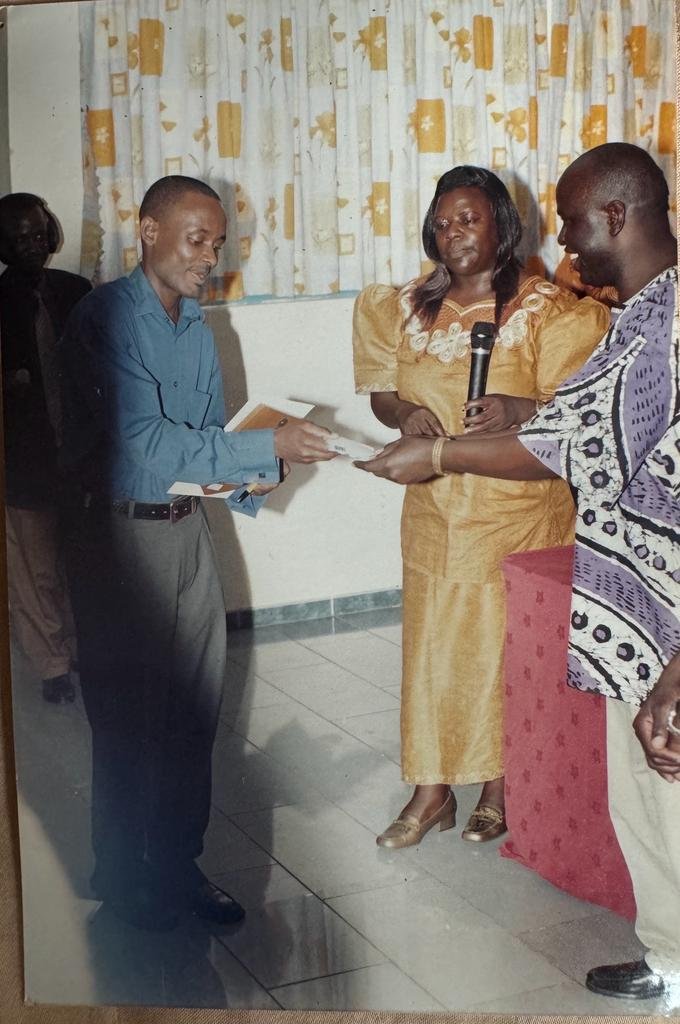
Zikusooka receiving the Tebere-Mudin Award from the then Managing Editor of the Daily Monitor, Wafula Ogutu and the then Head of Mass Communication Department, Dr. Goretti Nassanga
His family, though extremely happy, had seen it coming. With a special moment of hugs every semester, they shared in his progress, handing him chocolates and making him delicious chicken.
When he was honored on graduation day, Zikusooka had already lived the joy of a valedictorian after his marks were pinned on the noticeboard. He had earlier received lots of congratulatory phone calls and hugs, and although the graduation was special, he says the day was not such a thrill. He however believes the experience was the aggregate of his story coming together.
“My mum and I could have shed some tears; she was very proud of me,” recalls Zikusooka. His family organised a modest dinner at home and he went to work the following Monday at Terp Group, a public relations agency in Kampala, where he would later meet the love of his life who, unknown to him, had coincidentally been his student when he returned to teach as a part-time lecturer at the department.
For his academic excellence, Zikusooka garnered respect from his community and workmates, which formed part of his identity and came with an exceptional reputation and expectation of quality and social acceptance. “On the face of it, people think you know what you’re doing, they recognise it quickly on your Curriculum Vitae (CV) and desire to work with you,” he says.
Zikusooka has been well-placed and has lived up to his excellent output which is evident in the communications strategies that he has implemented, in his research and in the lives of people he has impacted.
Twenty years on
“Anyone can succeed if they put their heart into it. It’s what you do with what you have. There’s a process to quality,” remarks a successful Zikusooka who has blossomed beyond elementary journalism which he initially practiced with Daily Monitor and Red Pepper Publications, although does have his regrets. “I used much of my money to get stories done and lost motivation for journalism,” he says.
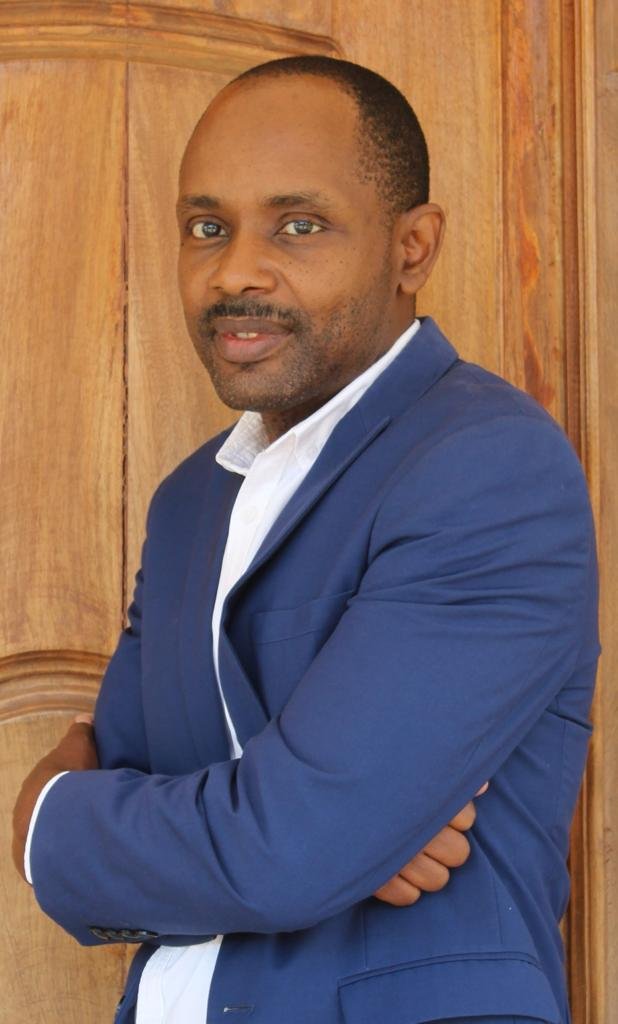
Amos Zikusooka
Zikusooka’s career has since accelerated towards development communication, a path less charted back in the day. He has worked in more than six countries including Malawi, Zambia, Ethiopia, Rwanda, and Cambodia, influencing development on an international scale. After his Master’s Degree at the University of Oslo in Norway, he worked with international government-supporting agencies such as Johns Hopkins Centre for Communication Programs and FHI 360. One of the significant campaigns he led and co-designed in 2013 is the still-famous Obulamu! Zikusooka has spearheaded public health campaigns, supported governments with analysis of social data and is still spreading his wings.
Related News
![]() Please join hands with the Makerere University Endowment Fund as it works towards attracting & retaining the best faculty, providing scholarships, and investing in cutting-edge research and technology.
Please join hands with the Makerere University Endowment Fund as it works towards attracting & retaining the best faculty, providing scholarships, and investing in cutting-edge research and technology.
